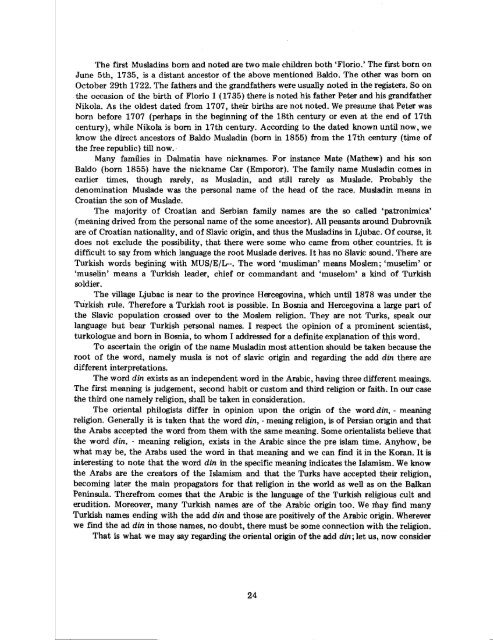Yugoslavia
Yugoslavia
Yugoslavia
Create successful ePaper yourself
Turn your PDF publications into a flip-book with our unique Google optimized e-Paper software.
The first Musladins born and noted are two male children both 'Florio.' The first born on<br />
June 5th, 1735, is a distant ancestor of the above mentioned Baldo. The other was born on<br />
October 29th 1722. The fathers and the grandfathers were usually noted in the registers. So on<br />
the occasion of the birth of Florio I (1735) there is noted his father Peter and his grandfather<br />
Nikola. As the oldest dated from 1707, their births are not noted. We presume that Peter was<br />
born before 1707 (perhaps in the beginning of the 18th century or even at the end of 17th<br />
century), while Nikola is born in 17th century. According to the dated known until now, we<br />
know the direct ancestors of Baldo Musladin (born in 1855) from the 17th century (time of<br />
the free republic) till now.<br />
Many families in Dalmatia have nicknames. For instance Mate (Mathew) and his son<br />
Baldo (born 1855) have the nickname Car (Emporor). The family name Musladin comes in<br />
earlier times, though rarely, as Musladin, and still rarely as Muslade. Probably the<br />
denomination Muslade was the personal name of the head of the race. Musladin means in<br />
Croatian the son of Muslade.<br />
The majority of Croatian and Serbian family names are the so. called 'patronimica'<br />
(meaning drived from the personal name of the some ancestor). All peasants around Dubrovnik<br />
are of Croatian nationality, and of Slavic origin, and thus the Musladins in Ljubac. Of course, it<br />
does not exclude the possibility, that there were some who came from other, countries. It is<br />
difficult to say from which language the root Muslade derives. It has no Slavic sound. There are<br />
Turkish words begining with MUS/E/L--. The word 'musliman' meanS Moslem; 'muselim' or<br />
'muselin' means a Turkish leader, chief or commandant and 'muselom' a kind of Turkish<br />
soldier.<br />
The village Ljubac is near to the province Hercegovina, which until 1878 was under the<br />
Turkish rule. Therefore a Turkish root is possible. In Bosnia and Hercegovina a large part of<br />
the Slavic population crossed over to the Moslem religion. They are not Turks, speak our<br />
language but bear Turkish personal names. I respect the opinion of a prominent scientist,<br />
turkologue and born in Bosnia, to whom I addressed for a definite explanation of this word.<br />
To ascertain the origin of the name Musladin most attention should be taken because the<br />
root of the word, namely musla is not of slavic origin and regarding the add din there are<br />
different interpretations.<br />
The word din exists as an independent word in the Arabic, having three different meaings.<br />
The first meaning is judgement, second habit or custom and third religion or faith. In our case<br />
the third one namely religion, shall be taken in consideration.<br />
The oriental philogists differ in opinion upon the origin of the word din, - meaning<br />
religion. Generally it is taken that the word din, - meaing religion, is of Persian origin and that<br />
the Arabs accepted the word from them with the same meaning. Some orientalists believe that<br />
the word din, - meaning religion, exists in the Arabic since the pre islam time. Anyhow, be<br />
what may be, the Arabs used the word in that meaning and we can find it in the Koran. It is<br />
interesting to note that the word din in the specific meaning indicates the Islamism. We know<br />
the Arabs are the creators of the Islamism and that the Turks have accepted their religion,<br />
becoming later the main propagators for that religion in the world as well as on the Balkan<br />
Peninsula. Therefrom comes that the Arabic is the language of the Turkish religious cult and<br />
erudition. Moreover, many Turkish names are of the Arabic origin too. We may find many<br />
Turkish names ending with the add din and those are positively of the Arabic origin. Wherever<br />
we find the ad din in those names, no doubt, there must be some connection with the religion.<br />
That is what we may say regarding the oriental origin ofthe add din; let us, now consider<br />
24


